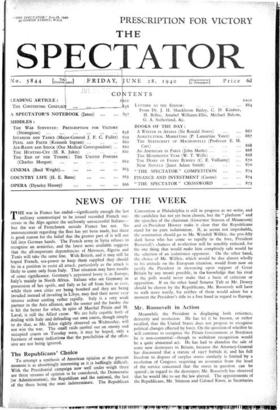Mr. Roosevelt in Action
Meanwhile the President is displaying both reticence, dexterity and resolution. He has let it be known, or rather recalled, that the United States does not propose to recognise political changes effected by force. On the question of whether he will continue to recognise the Petain Government at Bordeaux he is non-committal—though to withdraw recognition would be a quite abnormal act. He has had to abandon the sale of some new destroyers to Britain, because the Attorney-General has discovered that a statute of 1917 forbids it, and his full freedom to dispose of surplus stores similarly is limited by a resolution of Congress requiring an assurance from the head of the service concerned that the stores in question can be spared ; in regard to the destroyers Mr. Roosevelt has observed that he would like to see the law altered. The appointments of the Republicans, Mr. Stimson and Colonel Knox, as Secretaries for War and the Navy respectively have been challenged in the Senate, but they will almost certainly be confirmed. Out- side Washington, the movements of the American navy are arousing some interest. First one and then a second ro,000-ton cruiser have been despatched on " courtesy visits " to Uruguay and Brazil ; in Uruguay the danger of subversive intrigues is serious. Other cruisers and destroyers are at, or on their way to, Lisbon, for the general safeguarding of American interests in Europe. What may be considerably more important, the powerful American fleet in the Pacific is on the move to a destination regarding which officials at Washington, including the President, will say nothing. It may be bound for the Far East, where Japan's activities are exciting apprehension, or for the Atlantic for far other reasons. One thing is clear: even if the whole United States was passionate for isolationism isolationism and inactivity would alike be impossible for her under present conditions.



























